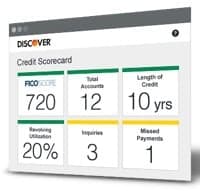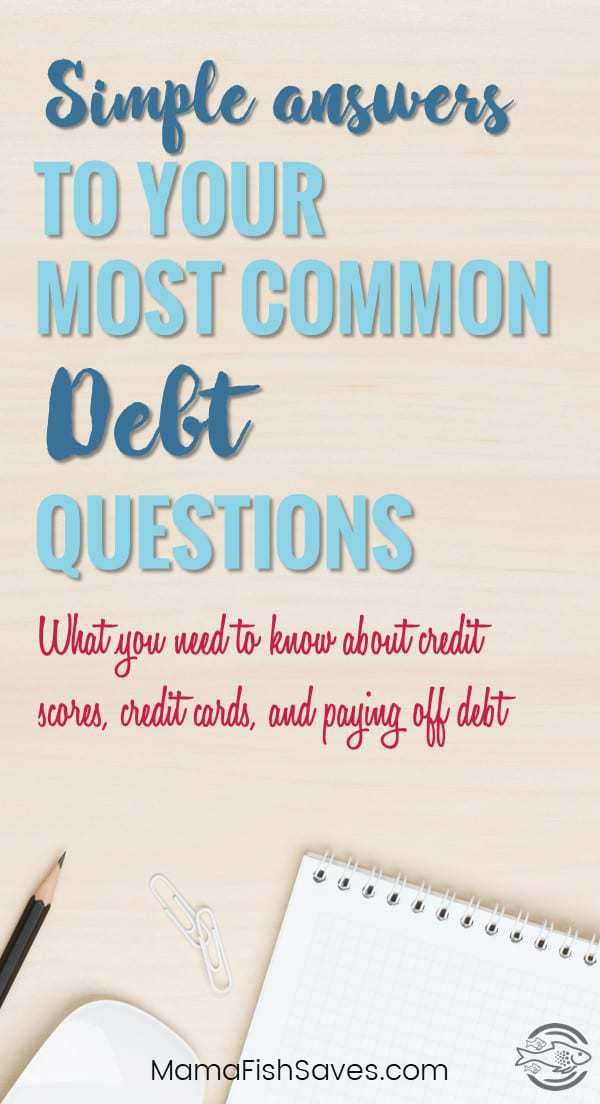Most financial blogs, this one included, focus on achieving a debt free life. However, most people aren’t debt free today and there are a lot of tough debt questions out there. There are a lot of misconceptions out there about how debt works. Understanding what to focus on and the mystery of credit score calculations is difficult! So here is a quick roundup of simple answers to 7 common debt questions.
Table of Contents
1 – Do I need to carry some credit card debt for a high credit score?
No. I am not sure where this rumor came from, but my goodness, it needs to die. All you need for a strong credit score is a longstanding credit card that you use at least occasionally (to keep it active). You can pay it off in entirety each month and never pay a dime of interest. The credit score agencies do not care whether or not the card carries a balance.
I got my first credit card, a Discover cash back card, in college. I don’t use it much anymore but I won’t close it as it is my oldest reportable “debt”. I have it set to automatically donate money to Soldier’s Angels every month to keep it active and it supports my credit score.
The main benefit of a high credit score is to allow you to get low-cost debt when you need it, for instance when applying for a mortgage. You never want to pay high interest rates to keep the option for low-interest rate debt. Plus, you don’t actually need to!
2 – Will paying off my debts lower my credit score?
Possibly. If you are paying off credit card debt and plan to leave the card outstanding, probably not. If you are paying off student loans or a car payment where the account will be closed after the debt is paid down, you might see a temporary decline in your score. The decline will likely be more significant if the debt you are paying off is one of your longer standing debts. Longevity of your credit history impacts your score, so closing older accounts could drop your score.
In general, this shouldn’t keep you from paying off your debts. According to VantageScore Solutions, it will typically take your credit score around 3 months to recover from a minor event like closing an account. If you are planning on applying for a mortgage or will otherwise have your credit score within the next 3 months you could pay the debt down to a minor level ($50) and wait to completely close the account.
3 – Should I stop using credit cards completely?
How’s your self-control? If you have a habit of running up more credit card expenses than you can pay off each month, you might want to tuck those cards away for at least a few months. Use cash or a debit card until you can get your spending under control. Otherwise, if you spend responsibly and can pay off your balance every month, you should absolutely keep using credit cards.
I pretty much exclusively use credit cards. It is so easy to track the expenses for budgeting, most cards offer payment protection, and I love the rewards points. In my opinion, cash budgeting systems are for the birds. If you can stay on budget and avoid carrying a balance, a credit card is a great tool.
4 – Should I invest or pay down debt?
Mathematically, over the long term, if your debt has an interest rate below 6% you could focus on investing for retirement instead of paying down debt. The long-term (30+ year) stock market return is 7% and your net worth will be higher if you invest first and pay down debt later. However, the functional answer isn’t that straightforward.
Choosing whether to invest or pay down debt is about your risk tolerance. I know people who would rather pay down a 3% mortgage than invest because owing anyone money makes them uncomfortable. Alternatively, China has a problem where its citizens are borrowing money at double-digit interest rates to invest in the stock market.
My rule of thumb is to first secure a decent emergency fund, then pay down high-interest (+9%) or variable rate debt, and then make sure you are putting away at least 10% for retirement. After that, it is up to you to decide if you want to grow your nest egg or pay down debt. The math often says invest, but if the economy turns and you are out of a job, that debt you didn’t pay off could haunt you.
5 – How often should I check my credit score?
 At least once a year. I use Discover’s Credit Scorecard to check my score about quarterly and to make sure I don’t see any accounts or inquiries I don’t recognize. I also like the security Discover offers since I know they will email me if there is a major change in my score from month to month.
At least once a year. I use Discover’s Credit Scorecard to check my score about quarterly and to make sure I don’t see any accounts or inquiries I don’t recognize. I also like the security Discover offers since I know they will email me if there is a major change in my score from month to month.
If you are planning on applying for a new job, buying a house, or refinancing debt I recommend checking your credit score a few months before these events. This will give you the opportunity to dispute anything on your account that you believe is incorrect and find ways to increase your score before you need it.
6 – When should I consider debt consolidation?
If after necessary living expenses and minimum debt payments you have no income left over for debt reduction, you may want to consider a debt consolidation loan to lower your interest rates. However, if you choose to go down this route, make sure you have made real moves to change your spending habits long term. A debt consolidation loan isn’t going to help you get out of debt if you keep spending more than you make.
Debt consolidation loans used to be popular to help reduce complexity. When you were getting six different bills in the mail and had to remember to pay each one with a handwritten check, moving to one loan sometimes meant less late or missed payments. But in the age of the internet, I think the reduced complexity argument is weak. In only a few minutes you can set up auto payment for your debts. Multiple loans also mean that as you pay down the debt you get the satisfaction of closing an account through your journey to a debt free life. The motivation of seeing six accounts go to five is worth more than you may think.
7 – I can’t pay my student loans. What can I do?
Federal Student Loans have options for Income-Based Repayment plans. These plans lower your required payments in line with your current income. This also, understandably, increases the amount of time it will take you to pay off the debt. However, it still may be a good source of relief if you can’t make ends meet today.
Unfortunately, in most cases, student loan debt can’t be discharged or canceled. Because of the option for income-based repayment, student loan debt is very hard to discharge, even in bankruptcy. You have to prove that not only can your income not pay down the debt today but that your lifelong earning power can’t satisfy the debt.
I would recommend pursuing an income-based repayment plan before considering refinancing or consolidating into a private loan. Private student loans are not required to have the same borrower protections as Federal student loans. You could end up even more stuck than you started.
What questions do you still have about debt? Let me know!




Thank you for this post! I knew my credit score was important but never really what things I could do to care for it!
I’m not as anti-debt as a lot of people, but there are so many misconceptions about credit cards and debt in general out there that scare people. I also use credit cards for everything and never carry a balance. We only have mortgage debt otherwise and my husband and I have credit scores in the mid-800’s. We get a big benefit in insurance rates and other things by paying attention to our credit, despite the fact that we don’t actually plan to need actual credit in the future.
Such good tips. I always avoid looking at debt because it makes me uneasy, but it’s something I need to look at and examine if I want to have a healthy financial future. Thanks!
When I was in college that was the first time I heard that carrying a balance was good. Clearly that must have come from the credit card industry b/c that is asinine.
Now I’m one of the weirdos that paid off my mortgage early but it made sense looking back. There was only a 0.1% difference between the stock market returns during the period and my mortgage 🙂
The techniques stated in this paragraph on the topic of student loans are really fastidious, thanks for such pleasant post. I am ready to apply some of what was discussed in this article to my current student loan situation.